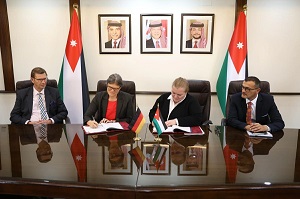Jordan and the Leadership of the Electronic Games Industry - By Hasan Dajah, The Jordan Times
The electronic games industry in Jordan has witnessed a radical transformation in recent years, making it one of the most promising sectors in the digital economy. This raises an important question: Can Jordan become a leading country in the production of electronic games regionally and perhaps even globally? The answer is no longer mere speculation, but is now supported by clear national figures, indicators and strategies, in addition to the direct support of His Royal Highness Crown Prince Hussein, who has made youth empowerment, digital transformation, and innovation key pillars of the Kingdom's economic modernization vision.
Recent reports indicate that the value of the electronic games market in Jordan reached approximately $312.8 million in 2024, with expectations that this figure will nearly double by 2030, driven by an annual growth rate of 11.5 percent. This rapid growth reflects the sector's transformation from a mere entertainment activity into an advanced industry that creates real economic opportunities. Dania Saeed, coordinator of the Game Design and Development program at Al Hussein Technical University, explains that the sector now offers vast opportunities in programming, game design and production, and digital export, in addition to esports, which has become a new economic driver capable of attracting sponsorships and investments.
A key factor contributing to this transformation is Jordan's entry into specialized academic education in the field of electronic games. Just two years ago, Al Hussein Technical University launched the Kingdom's first academic program dedicated to game design and development, an achievement that lays the foundation for a new generation of developers and local innovation. The program relies on applied learning, real-world projects, and partnerships with international companies, equipping students with practical skills that enable them to compete in the regional and global markets. Universities entering this field represents a shift from individual interest to the integration of the sector within educational institutions, promoting sustainability and solidifying a culture of creativity and technology.
The founder and CEO of Tamatem Games affirms that the Crown Prince's support has contributed to transforming the gaming industry into a key component of Jordan's digital economy, raising awareness of its value and its ability to create jobs and support the creative economy. Today, Tamatem is one of the leading game publishers in the Middle East, with its games reaching millions of users. This success reflects the ability of Jordanian companies to compete globally, proving that Jordan not only possesses a wealth of young talent but also the capacity to transform this talent into digital products exported worldwide.
The CEO of Missalward points out that the establishment of the Jordanian Gaming Lab, launched with support from the King Abdullah II Fund for Development, and the Aqaba Gaming Lab in 2016, has played a significant role in discovering and developing talent, not only in the capital, Amman, but also in other governorates. The two labs function as a creative community, connecting young people with education, training, and support resources, and helping them transform their ideas into startups. This expansion beyond urban centers promotes equitable access to opportunities and empowers talent to thrive without having to leave their hometowns.
Jordan's efforts extend beyond initiatives and training to include the development of clear national policies aimed at investing in the esports and digital sports sectors. The government launched the "National Strategy for Gaming and Esports 2023–2027," which aims to increase the sector's contribution to 3 percent of GDP, create 3,000 new job opportunities for young people, attract investment and support startups, and establish four national centers specializing in training and development. This strategy aligns with the Economic Modernization Vision 2033, which aims to transform the Jordanian economy into one based on creativity and innovation.
The successes achieved by Jordanian companies today in global markets are not isolated incidents, but rather the result of an integrated system encompassing education, government support, specialized laboratories, business incubators, and pioneering companies that pave the way for others. Jordan possesses a unique advantage: a highly creative youth workforce, advanced technological infrastructure, and institutional support that fosters continued growth. Furthermore, the legislative environment has become more conducive to attracting foreign investment, making Jordan a magnet for Arab and international companies seeking professional developers.
Hasan Dajah is professor of strategic studies at Al-Hussein Bin Talal University




